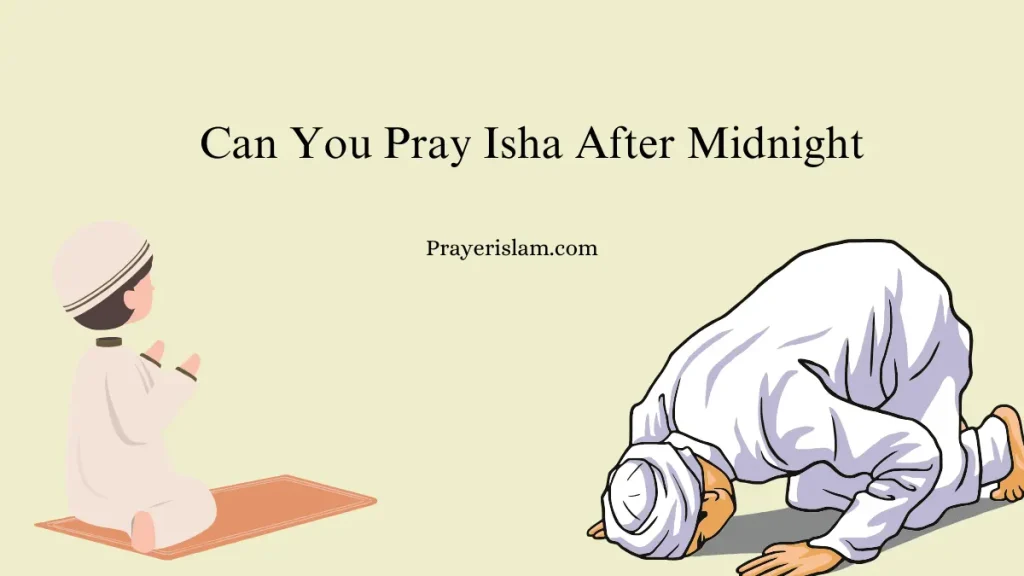Prayer, or Salah, is one of the five pillars of Islam, and it is obligatory for every Muslim to perform it five times a day at prescribed times. Isha, the night prayer, is the last of these five daily prayers. However, many Muslims wonder whether it is permissible to pray Isha after midnight. In this blog post, we will explore the timing of Isha prayer, its significance, and the ruling on performing it after midnight. We will also provide a word-by-word analysis of the related dua and answer some common questions regarding Isha prayer.
Understanding the Isha Prayer
Isha (عِشَاء): The Isha prayer is the fifth and final prayer of the day. It is performed after the twilight has disappeared and the night has fully set in. This prayer consists of four units (rak’ahs) and is a means of seeking Allah’s guidance and protection during the night.
The Prescribed Time for Isha Prayer
The time for Isha prayer begins when the red twilight in the sky has disappeared, which is generally about an hour and a half after Maghrib (sunset) prayer. The time for Isha continues until midnight, but the question arises: can you pray Isha after midnight?
The Ruling on Praying Isha After Midnight
According to the majority of Islamic scholars, it is preferable to perform Isha prayer before midnight. However, if one is unable to do so due to valid reasons, it is permissible to pray Isha after midnight, but before the time of Fajr (the dawn prayer).
Hadith Reference:
The Prophet Muhammad (ﷺ) said:
“The time of Isha is until midnight.”
(Sahih Muslim)
This hadith indicates that the preferable time for Isha is until midnight. However, scholars agree that if someone prays after midnight, they will still receive the reward for performing Isha, as long as it is done before Fajr.
What Constitutes Midnight in Islamic Terms?
In Islamic jurisprudence, ‘midnight’ is not necessarily 12:00 AM according to the clock. It is the halfway point between Maghrib (sunset) and Fajr (dawn). This time varies depending on the season and geographical location.
Example Calculation:
If Maghrib is at 6:00 PM and Fajr is at 5:00 AM, the time of midnight would be around 11:30 PM.
Read More:
- Can you pray Isha after 12 am? Correct answer and conclusion
- Can I pray tahajjud without sleeping? Everything you need to know
Word-by-Word Analysis of the Related Dua
When performing Isha prayer, it is recommended to recite the following dua after Salah:
Arabic Text:
اللَّهُمَّ إِنِّي أَسْأَلُكَ الْعَفْوَ وَالْعَافِيَةَ
Transliteration: Allahumma inni as’aluka al-‘afwa wal-‘afiyah
Translation: “O Allah, I ask You for pardon and well-being.”
Word Analysis:
- Allahumma (اللَّهُمَّ): O Allah
- Inni (إِنِّي): Indeed, I
- As’aluka (أَسْأَلُكَ): Ask You
- Al-‘afwa (الْعَفْوَ): For pardon
- Wal-‘afiyah (وَالْعَافِيَةَ): And well-being
This dua is a beautiful supplication asking Allah for forgiveness and protection, which aligns with the themes of the Isha prayer, seeking guidance and safety through the night.
The Importance of Praying Isha on Time
Praying Isha on time is important as it ensures that the prayer is performed within its prescribed period, which is a requirement for Salah. Delaying the prayer without a valid reason may result in missing the preferred time, which is discouraged.
Excuses for Delaying Isha Prayer
There are certain valid reasons that may allow one to delay Isha prayer, including:
- Illness or Fatigue: If one is too tired or unwell to pray at the prescribed time, it may be delayed.
- Travel: If one is traveling and cannot pray Isha at the right time.
- Work or Other Obligations: If one is engaged in unavoidable work or responsibilities.
Making Up for Missed Isha Prayer
If someone unintentionally misses Isha prayer before midnight, it is essential to make it up as soon as possible. This is known as Qada Salah. However, the reward for praying within the preferred time cannot be replaced.
Tips for Ensuring Timely Isha Prayer
- Set Alarms: Use alarms or reminders to ensure you do not miss Isha prayer.
- Pray in Congregation: If possible, perform Isha prayer at a mosque where it is easier to pray on time.
- Avoid Procrastination: Make it a habit to pray Isha as soon as the time starts.
FAQs on Praying Isha After Midnight
Q1: Is it sinful to pray Isha after midnight?
A: It is not sinful to pray Isha after midnight if you have a valid reason. However, it is preferable to pray before midnight.
Q2: Can I combine Isha with another prayer?
A: Combining Isha with Maghrib is allowed in certain situations, such as during travel or illness.
Q3: What should I do if I miss Isha before midnight?
A: You should perform the prayer as soon as possible. It is better to pray late than to miss it entirely.
Q4: Is it better to pray Isha earlier or later?
A: It is generally recommended to pray Isha earlier within its time range, but if delayed, it should still be performed before Fajr.
Q5: Can Isha be prayed at home?
A: Yes, Isha can be prayed at home, especially for women, though it is encouraged for men to pray in congregation at the mosque if possible.
Conclusion
The Isha prayer holds significant importance as the final prayer of the day, offering Muslims an opportunity to seek Allah’s protection and guidance before the night begins. While it is preferable to perform Isha before midnight, it remains permissible to pray after midnight if necessary. Understanding the timing, significance, and rulings of Isha prayer helps ensure that it is performed correctly and with the proper intention. By keeping this knowledge in mind, Muslims can strengthen their connection with Allah and maintain their spiritual discipline.
May Allah grant us the ability to perform our prayers on time and with sincerity. Ameen.







